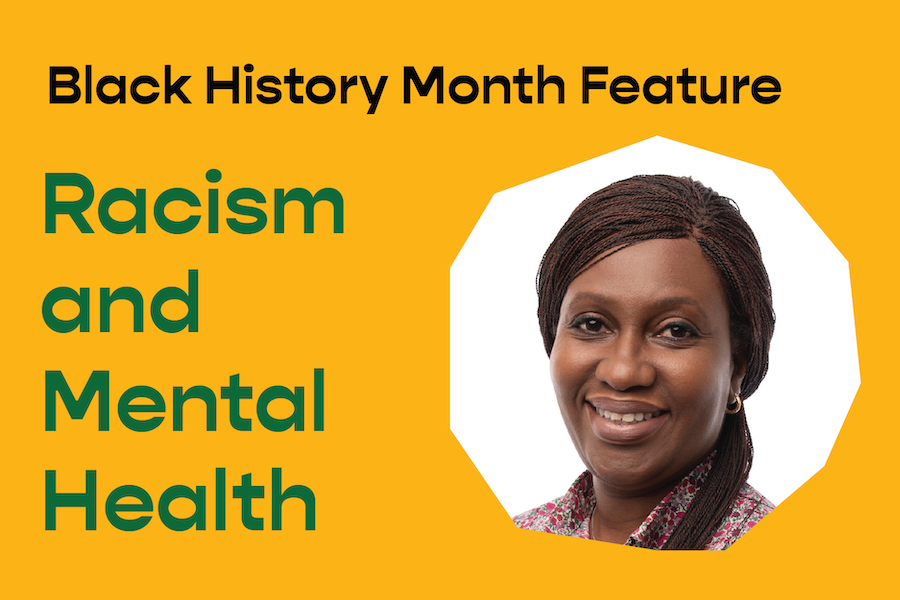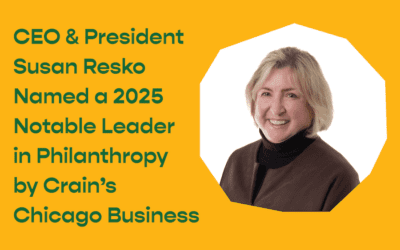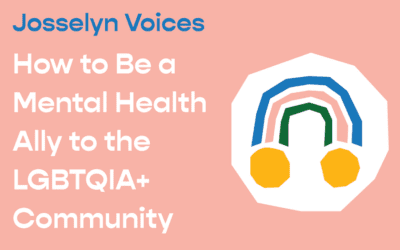By Bunmi Bayode
February 24, 2022

Black History Month Feature
This month we’re hearing from some of Josselyn’s staff who are proud members of the Black community, and who will share what Black History Month and mental health means to them.
This edition of Talk features Bunmi Bayode, LPC, Staff Therapist.
As we celebrate Black History Month once again, the importance of mental health continues to be at the forefront of the nation, especially as we continue to deal with the impact of the Covid-19 pandemic.
In my time at Josselyn, I have worked with and treated a dozen or more Black clients – adults and children who specifically asked for a therapist of color, with the pervading reasons being: “I want someone who will be able to understand where I’m coming from without me having to explain some things” or “I will feel restricted in what I really want to share if I have a white counselor.”
According to the Substance Abuse and Mental Health Administration (SAMHSA) and the Center for Disease Control (2016), African Americans access mental health services at half the rate that White Americans and Asian Americans do, whilst experiencing mental health problems at higher rates than White Americans. Some of the reasons why Black people resist seeking mental health services (and other services) are:
- stigma of having mental problems,
- attitudes about what it means to be self-reliant and “not airing your dirty linen in public,”
- lack of access to services (be it awareness, location, or financial constraints),
- a preference to seek other resources especially within the church,
- and a fear and distrust of systems that have historically done damage to the Black community, for example the overdiagnosis and misdiagnosis of Black people with schizophrenia (Tahmi Perzichilli, 2010).
The impact on the mental health and functioning of Black people (and other people of color in America) from centuries of racial violence and systemic racism cannot be brushed aside. Daily and sustained experiences of racism (whether direct or subtle) that Black people deal with often results in devastating and long-term effects on their mental health. The impacts of systemic racism has led to limited or no access to decent housing, bank loans/mortgages, quality health care and mental health services, decent education at every level, and wealth building, which, in turn, can manifest into depression, anxiety, PTSD, anger, and problems of domestic violence to name a few.
Having a Black therapist does not mean that the therapist has the same shared experiences of racism, but it does mean that the therapist can empathize and understand the nuances that come with living as a non-dominant person within a dominant culture in society; it means the therapist can appreciate some of the feelings of anger, helplessness and frustrations that come with the exhaustion of daily racial injustices and racism.
How can White therapists in particular help our Black clients (and clients of color) to be confident that though they have no experiences of racism, they can genuinely and authentically hear them and sit with them even when they (the therapist) finds it uncomfortable?
- Understanding the history of racism in this country from the lens of Black history and Black people and not from what was taught (or not taught) in school and challenging our own understanding of what we think we know about that history is crucial. As a Nigerian-British, I must educate myself about the history of racism and racial violence in America and its continued impact on Black people even today – understanding from other perspectives the impact of redlining, disparities in access to social services, health, mental health services, quality education and the racialization of people of color. Without specific training and understanding of this history, there is a danger of clinicians re-traumatizing clients if they sense there is no real understanding of what everyday life looks like.
- Some trauma-informed training geared towards the traumas of racism is necessary. Being a culturally competent counselor is no longer enough, and the training undertaken during graduate school is no longer adequate.
- Go deeper with creating a safe environment for your Black clients. The therapeutic relationship is paramount, but trust and safety cannot be reached without transparency. As the professional, you broach the topic of racism from a place of concern and the role it has played on the client’s mental health.
- As therapists, we need to take regular stock of and reflect on our own inbuilt biases and challenge them, but also being brave enough to get feedback from colleagues. Having open and honest conversations around race is critical, otherwise how might one’s own unchecked bias or understanding of the effect of racism, “color” the therapist’s own actions or work in the therapy room?
- Engage with communities of color, either in advocacy or even pro bono work or even better, spend a day (or weekend) celebrating a cultural day. Baby steps, but important steps.
Bunmi Bayode is a Staff Therapist who joined the Josselyn team two years ago. She was born in Nigeria and raised in England, where she trained as a lawyer. She and her family live in Lake Bluff.




